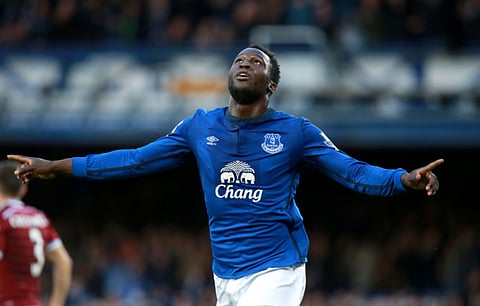Everton’s traditional centre-forward
Romelu Lukaku is a striker who could play in any era

Liverpool: There is much about modern football that would bewilder a visitor from 100 years ago.
Even after they had got used to the lightweight kit, the ball that bent and swerved and did not absorb water as the game went on, the firm and grassy pitches, the goalkeepers in latex gloves and the extraordinary cost of everything, they would still be puzzled by how the game was played.
Why all the defenders? And why did they all play so far from their goal? And what was the goalkeeper doing coming that far out? (Get back! You’re not Leigh Roose!). And why did so many strikers play like GO Smith of the Corinthians, dropping deep all the time? But Everton would provide him with some solace.
All the seats and the blue plastic might confuse him but the Archibald Leitch latticework along the front of two stands would be familiar.
And then they would see Romelu Lukaku and recognise a player they understood absolutely.
Lukaku is a striker as old as football itself.
This is what centre-forwards have always done. They are big and quick and powerful. They stand around the box. They win headers. They score goals.
From Dixie Dean to Didier Drogba, this is the image of the No. 9.
Football is a sport that has undergone countless transformations in its century and a half of codified existence.
Other positions have been evolved beyond all recognition.
It is one of the great strengths of football that it can be played in so many ways.
But however many variants of the centre-forward there now are, from poachers to false nines, there will always be a place in the game for strikers who can outpace and outmuscle the opposition and score goals.
Lukaku stands in the oldest of traditions.
The Belgium striker’s 21 league goals this season are all the more impressive when it is borne in mind that he does not take Everton’s penalties.
He has scored a free-kick but his other 20 goals have all come from inside the box, nine with his left foot, six with his right and five with his head.
It is that aerial ability that sets him in the lineage of the traditional centre-forward: he wins 3.6 duels per game, the ninth highest figure in the league for a forward.
There are doubts about him. He can fade out of games. He remains something of a mood player, although it should be remembered that he is still only 23: only Robbie Fowler, Michael Owen and Wayne Rooney have reached 50 Premier League goals at a younger age.
Age may bring greater consistency, although his three younger predecessors suggest it may merely bring heavier limbs.
His first touch can be heavy. Only nine players have been dispossessed more than him this season, although given that list includes Diego Costa, Alexis Sanchez, Raheem Sterling and Sadio Mane, that stat perhaps says little more than that he plays as a forward.
Fewer than two in three of his passes find their target.
If touch can be measured by how often poor control has cost him possession, Lukaku actually ranks relatively well: he is only the 21st worst offender, behind Mane, Sanchez, Zlatan Ibrahimovic, Sergio Aguero, Paul Pogba, Harry Kane and Diego Costa.
His zone of operation is bracingly old-fashioned: no outfield player ran less than him last season.
Although Ronald Koeman has tried to encourage him to lead the press, the comparison with his opposite number on Saturday is telling: Lukaku runs an average 2.8km per game less than Roberto Firmino.
The benefit of that is perhaps seen in the fact that 10 of his goals have come in the final quarter-hour of games.
If he ran more earlier in the game, would diminished freshness make him less effective in those closing minutes?
And that, perhaps, is the most intriguing of the doubts about him. Ibrahimovic speaks fondly in his autobiography of getting to Juventus where Fabio Capello promised to “knock Ajax out of your body” and encouraged him to haunt the box, focusing on goalscoring.
Koeman now, without the pressure of Ajax’s expected style of play — as embodied by his technical director Louis van Gaal — is a more relaxed figure, more prepared to let Lukaku be the player he is rather than the player the system demands he ought to be, but that post-Cruyff philosophy remains dominant at many of Europe’s top clubs.
Lukaku, for instance, could not successfully change places with Firmino, who makes eight times more tackles per game.
Nor would he fit in at Tottenham, Manchester City or Barcelona. A club of Everton’s stature will bend to accommodate a talent like Lukaku; the absolute elite will not.
That is why, with his new contract unsigned, the two clubs leading the queue are Chelsea and Manchester United, both of which, under their current managers, would prioritise goals over assimilation.
But he is far from unique in that. Just because Lukaku is not a modish type of forward does not mean that he is not an extremely effective one. And if the visitor from 100 years ago wanted to take him back, he would be effective then as well.


